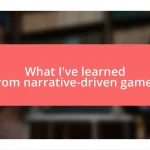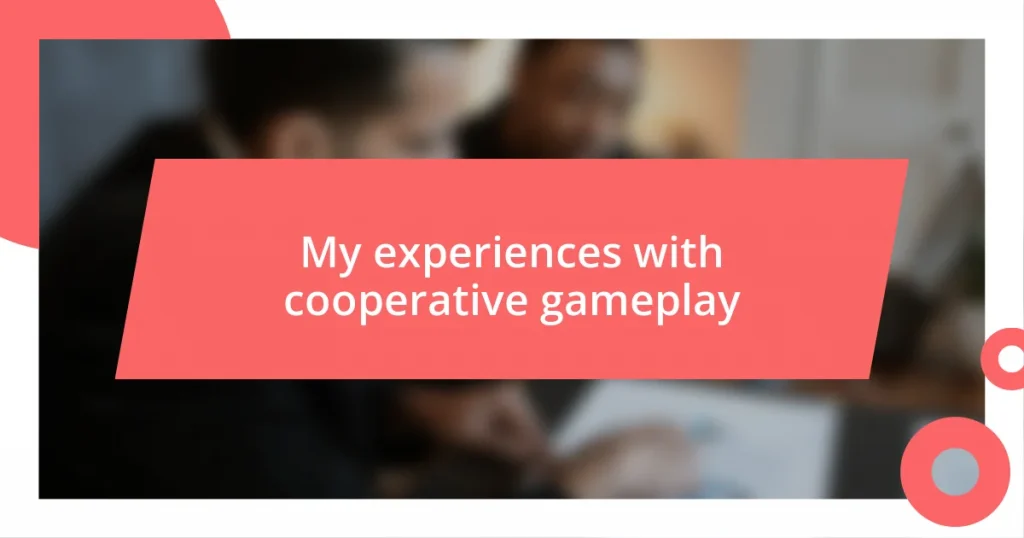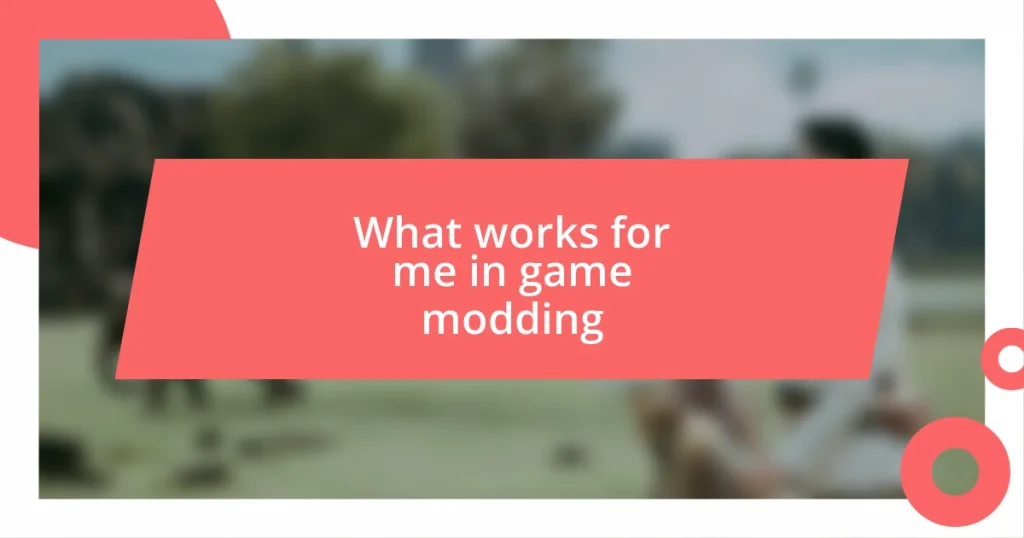Key takeaways:
- Cooperative gameplay enhances relationships through shared experiences, requiring effective communication and teamwork.
- Various types of cooperative gameplay, such as team-based, puzzle-solving, and RPGs, offer unique challenges and foster emotional connections.
- Success in cooperative games relies on clear roles, open communication, and flexibility, transforming the gameplay experience and strengthening team dynamics.
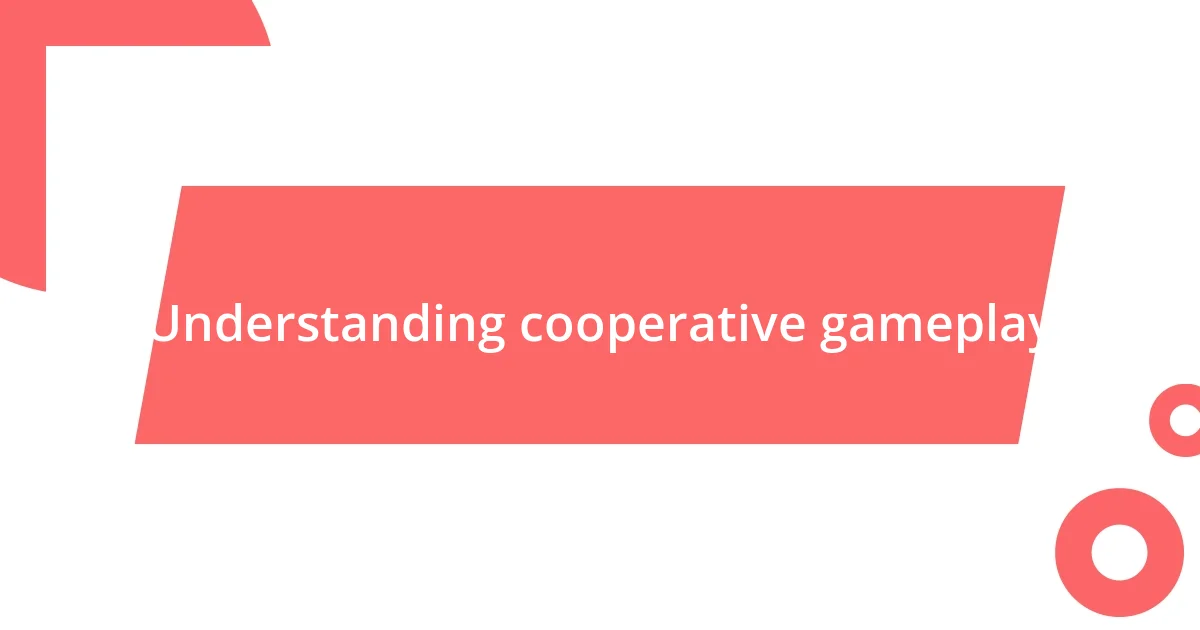
Understanding cooperative gameplay
Cooperative gameplay, at its core, is about joining forces to achieve a common goal, and I’ve seen firsthand how powerful that can be. I remember playing a board game where we had to defend a fortress from swarms of attackers. The thrill of strategizing against a looming defeat alongside my friends created a bond that felt almost electric. Isn’t it fascinating how teamwork can turn a simple game into a memorable experience?
One of the most profound aspects of cooperative gameplay is the need for communication. I’ve played games where we had to relay information quickly, and sometimes, just a single missed word could lead to chaos. It made me realize how critical it is to be both a good listener and a clear communicator. Have you ever found yourself in a situation where a small misunderstanding led to a hilarious or catastrophic result?
Moreover, the emotional highs and lows we’ve shared in these games are unforgettable. The rush of victory after a tough battle or the comradery after a well-fought loss—each moment reinforces how cooperative gameplay brings people together. Reflecting on these experiences, I often wonder: how many friendships have been deepened through a shared goal, even in the simplest of games?
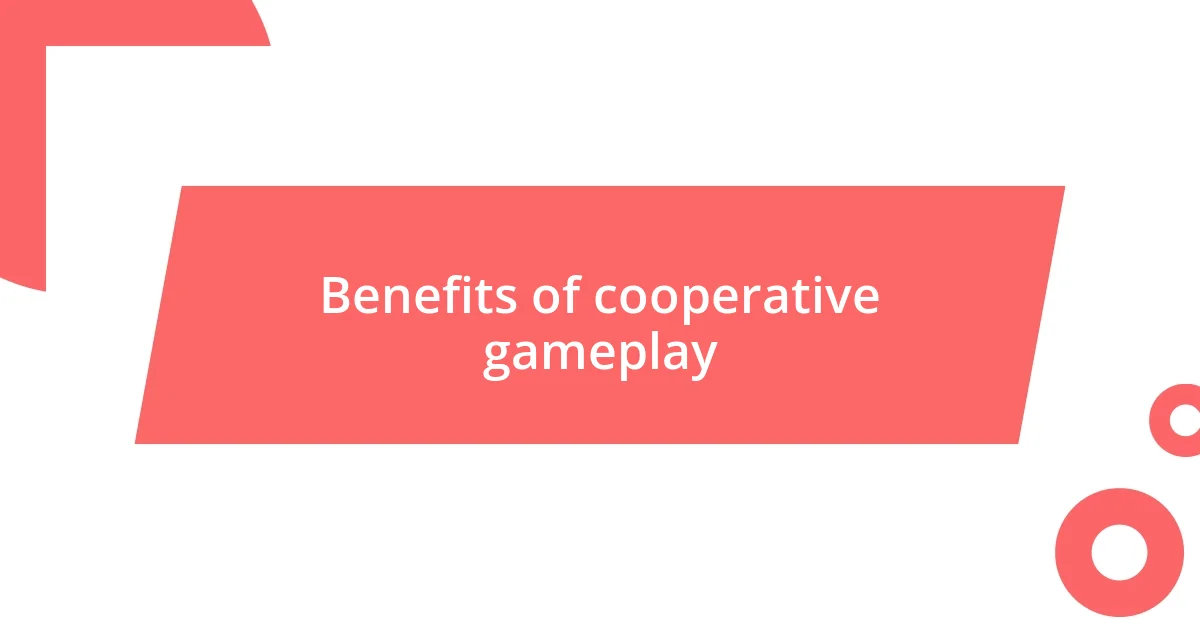
Benefits of cooperative gameplay
One of the standout benefits I’ve experienced with cooperative gameplay is the sense of achievement that comes from working together. I recall a particularly intense session playing a dungeon crawler with friends, where we faced a nearly impossible boss. After strategizing and executing our plans, when we finally took down that foe, the elation we all felt was indescribable. This feeling of shared success not only boosts our morale but also strengthens our relationships. It’s amazing how a single victory can make you feel closer to others.
The collaborative nature of these games promotes valuable skills like empathy and patience. Here are some specific benefits I’ve observed:
- Enhanced Communication: Collaborators must articulate their thoughts clearly and listen actively.
- Stronger Bonds: The teamwork required fosters friendships, often spilling over into real-life connections.
- Skill Development: Players can learn to adapt and strategize, improving both critical thinking and problem-solving skills.
- Shared Responsibility: Understanding that each member plays a crucial role can lead to greater appreciation for one another’s strengths and weaknesses.
- Inclusive Environment: Cooperative gameplay often creates a space where everyone’s input is valued, making it accessible for all players, regardless of experience.
These elements enrich not only the gaming experience but also the relationships formed through it—something I cherish deeply.
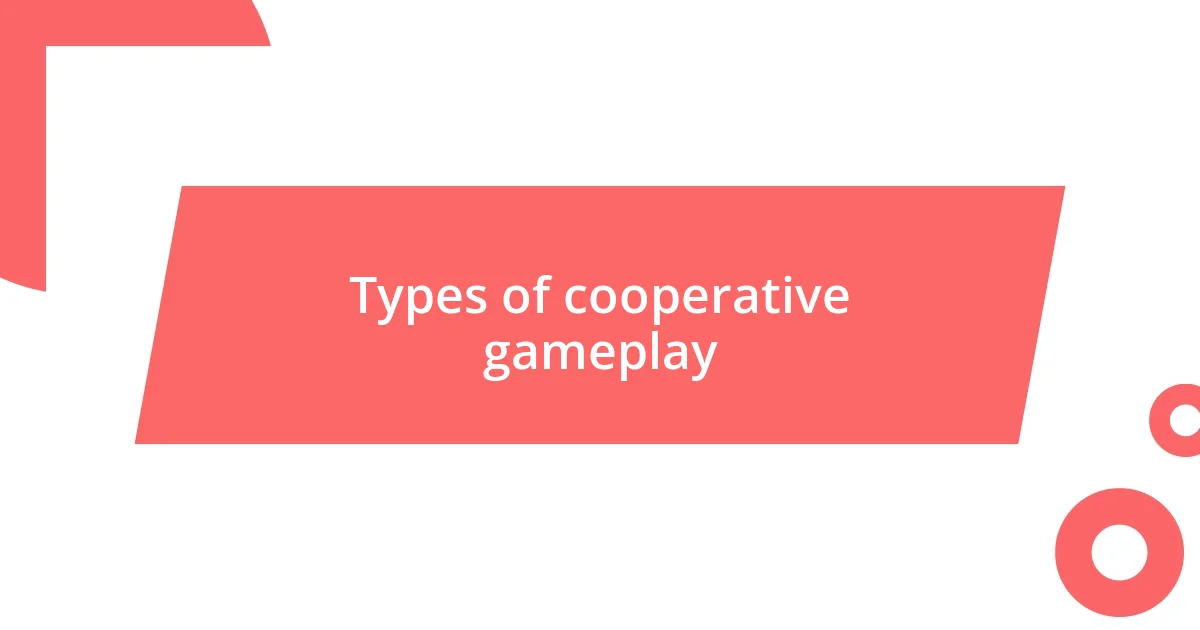
Types of cooperative gameplay
Cooperative gameplay can be classified into several types, each offering unique experiences and challenges. One type that stands out is the team-based gameplay found in many first-person shooters. I remember diving into “Overwatch” with friends, where we had to select characters that complemented each other’s abilities. Coordinating our roles was both challenging and exhilarating, especially when we pulled off a well-timed attack that led us to victory. Isn’t it intriguing how character dynamics can change the entire flow of a match?
Another popular category is puzzle-solving games. In titles like “Keep Talking and Nobody Explodes,” one person is tasked with defusing a bomb while others provide instructions without seeing the bomb itself. I can recall moments where my heart raced as I struggled to relay complicated information under pressure. The thrill of working together in such a high-stakes environment made every successful detonation feel like a mini celebration. It’s fascinating how these gameplay styles foster problem-solving and communication in dynamic ways.
Lastly, role-playing games (RPGs) that allow for cooperative play introduce a narrative depth not found in other genres. My experience with “Final Fantasy XIV” exemplified this; teaming up with others to tackle dungeons felt like embarking on epic quests together. The emotional connection grew as we shared victories and defeats, weaving our individual stories into one larger narrative. I often find myself reflecting on how these interactions not only shape the gameplay but also bind friendships in ways that transcend the virtual world.
| Type of Cooperative Gameplay | Description |
|---|---|
| Team-based Gameplay | Focuses on character roles and teamwork to achieve victory, often seen in FPS games. |
| Puzzle-solving Games | Involves communication and strategy to solve challenges, requiring quick thinking from players. |
| Role-playing Games (RPGs) | Emphasizes narrative collaboration and shared quests, enhancing emotional connections among players. |
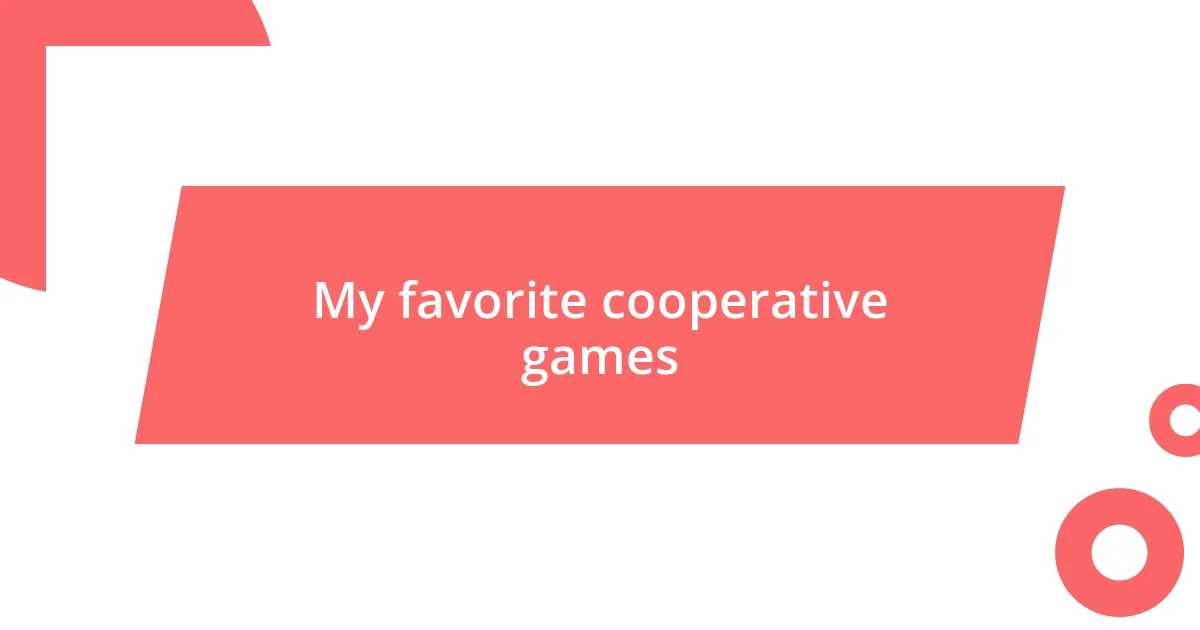
My favorite cooperative games
When I think about my favorite cooperative games, “Portal 2” instantly comes to mind. This game’s cooperative mode was a revelation for me; solving puzzles required not just logical thinking but an intuitive sense of teamwork and timing. I remember one afternoon where my partner and I spent hours trying to navigate a particularly tricky area. The laughter and occasional frustration we shared made the experience unforgettable and reinforced my belief in the power of collaborative problem-solving.
Another top contender for me is “Phasmophobia.” This title brings a unique twist to cooperative gameplay as you and your friends become ghost hunters, relying heavily on communication and strategy. I’ll never forget the shivers running down my spine as we explored a haunted house, our hearts racing whenever we heard eerie sounds. The shared thrill of encountering a ghost made every encounter feel like an adventure, deepening not only the gameplay but also our friendship as we navigated fear together. Have you ever felt that blend of tension and excitement while playing with friends? It’s truly something special.
Lastly, “Minecraft” deserves a shoutout for its versatility in cooperative play. I’ve spent countless hours building massive structures and exploring the different biomes with friends. I distinctly recall one night where we decided to create an entire village together. The sheer joy of sharing ideas and collaborating on our vision brought us closer. Plus, the moments of triumph when we completed our building project added a layer of satisfaction that solo gameplay simply can’t match. Isn’t it fascinating how a shared digital space can create real-life bonds?
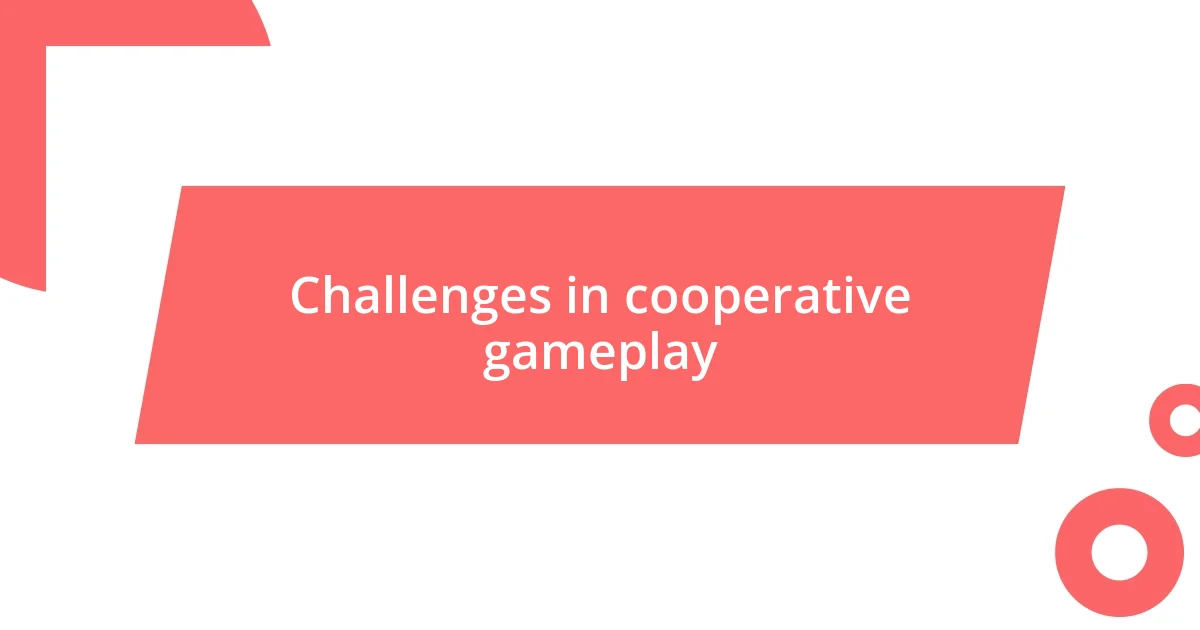
Challenges in cooperative gameplay
Cooperative gameplay, while fun, isn’t without its hurdles. One of the biggest challenges I’ve encountered is miscommunication. I remember a time in “Left 4 Dead” when my teammate and I were supposed to set up a defensive position before the horde arrived. Instead, we got our signals crossed, and I found myself solo against a wave of zombies while my partner stood a few feet away, oblivious to my plight. It made me realize just how critical clear communication is – without it, the best-laid plans can crumble in an instant.
Another aspect that complicates cooperative gameplay is varying skill levels among players. I’ve played with friends who are seasoned gamers, while I’m still figuring out the mechanics. This discrepancy can lead to feelings of frustration or inadequacy. I can recall playing “Sea of Thieves,” where my friends effortlessly sailed the seas while I struggled to grasp the game’s basics. It pushed me to improve, but it also reminded me of the importance of patience and encouragement in a team environment. Have you ever felt left behind in a game, and how did that shape your experience?
Lastly, there’s the challenge of differing playstyles. In “Divinity: Original Sin 2,” I found myself wanting to explore every nook and cranny, while my friend was eager to rush into the next battle. This difference sometimes led to disagreements about strategy. I learned the hard way that finding a middle ground is essential; balancing exploration with action can bring richness to the gameplay. Learning to appreciate each other’s approaches ultimately enhanced our cooperation and made for memorable adventures. Isn’t it fascinating how these challenges can also strengthen bonds in unexpected ways?
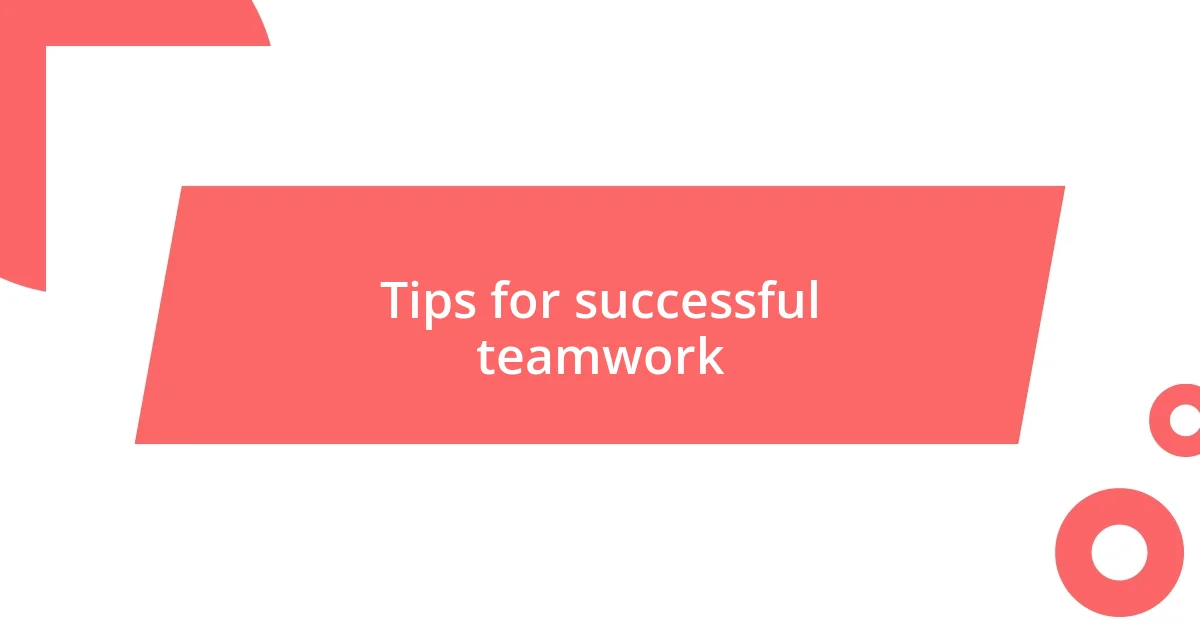
Tips for successful teamwork
One key to successful teamwork in cooperative gameplay is establishing clear roles early on. I’ve found that when everyone knows their specific tasks, the gameplay flows more smoothly. For instance, during a particularly intense session of “Overcooked,” my friend took charge of cooking while I focused on plating and serving. This division made frantic moments feel more organized and our laughter even louder. Have you ever had a team that meshed so well it felt like a choreographed dance?
Another important tip is to maintain open lines of communication. I recall a thrilling time playing “Among Us,” where the difference between winning and losing hinged on how well we conveyed information. I remember giving a casual shout-out every time I witnessed something suspicious. This seemingly simple action led to a clearer understanding among teammates and ultimately a strategic victory. How do you keep the lines of communication open when the stakes are high?
Lastly, embracing flexibility can transform your gameplay experience. In “Rainbow Six Siege,” I once committed to a plan that quickly fell apart after the enemy team outsmarted us. Adjusting on the fly not only saved the round but also taught me the value of adaptability. How often do you find yourself needing to pivot your strategy mid-game, and how does that shift impact your team dynamics? I’ve discovered that being flexible boosts not just success but also camaraderie, making each victory even sweeter.
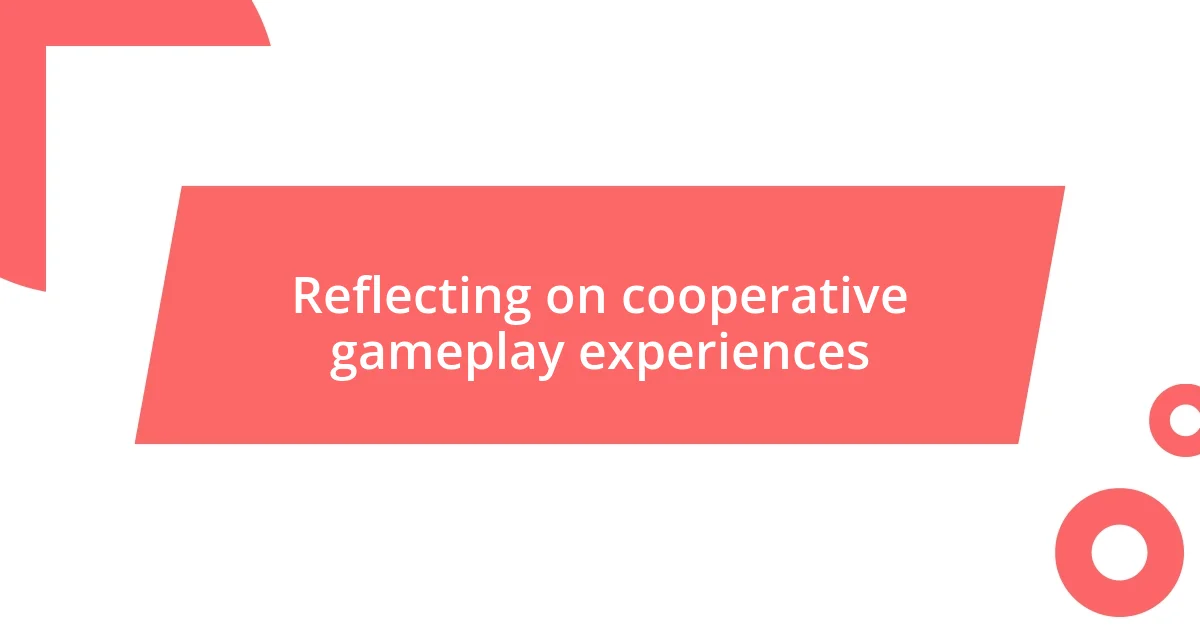
Reflecting on cooperative gameplay experiences
Reflecting on my cooperative gameplay experiences brings to light the myriad of feelings I’ve encountered. I still remember a particularly chaotic session in “Fortnite,” where our squad was ambushed by an enemy team right before we were about to claim victory. In the heat of the moment, I felt a wave of frustration mixed with adrenaline as we scrambled to regroup and strategize. Looking back, I realize that those frantic moments, filled with a mixture of excitement and panic, solidified our connection as teammates and highlighted the bonds forged through adversity.
Another memorable experience comes from playing “Portal 2” with a close friend. The game is famously known for its co-op puzzles, and as we navigated their complexities, we often found ourselves laughing at our missteps. I’ll never forget the moment we accidentally launched ourselves into a pit—our shared laughter echoed in my memory for days. It made me appreciate how cooperative gameplay isn’t just about succeeding together but also about enjoying the journey, even when it goes hilariously wrong. Have you ever had a moment in a game where everything seemed to fall apart, but it brought you and your friends closer together?
Lastly, I’ve noticed that cooperative gameplay can unveil hidden aspects of oneself. During a faction raid in “World of Warcraft,” I discovered my naturally supportive role, tending to teammates’ needs while pushing through challenges. It became clear to me that cooperative gameplay isn’t solely about completing quests or defeating bosses; it’s also about how we uplift each other along the way. In what ways have your gaming experiences revealed something new about yourself or your friends? For me, it’s been a journey of self-discovery, bridging my passion for gaming and my deep appreciation for teamwork.



